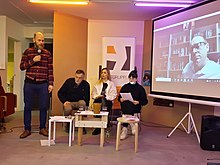Per Anders Rudling (born 11 April 1974 in Karlstad)[1] is a Swedish-American historian[2] and an associate professor in the Department of History at Lund University (Sweden). He specializes in the areas of nationalism.
Per Anders Rudling | |
|---|---|
 Rudling (on the video screen, right) | |
| Born | 11 April 1974 |
| Nationality | Swedish-American |
| Education | Uppsala University, San Diego State University, University of Alberta |
| Occupation | Academic |
| Notable work | The Rise and Fall of Belarusian Nationalism, 1906-1931 2014 book |
Education
Rudling holds a Master of Arts degree in Russian from Uppsala University (1998), a Master of Arts degree in history from San Diego State University (US) (2003), a Ph.D. in history from the University of Alberta (Canada) (2009), and completed a post-doc at the University of Greifswald, Germany.[3]
Career
He is the author of The Rise and Fall of Belarusian Nationalism, 1906-1931, published by the University of Pittsburgh Press,[4] devoted to the subject of present-day Belarusian nationalism from its origins until the 1930s.[5] The book won the Kulczycki Book Prize in Polish Studies in 2015.[6]
Rudling gained international attention in October 2012 when a group of Ukrainian organizations in Canada delivered a signed protest to his employer, accusing him of betraying his own university's principles.[7] The letter was a response to Rudling's public criticism of what he considered a glorification of OUN-B, UPA, Stepan Bandera, and Roman Shukhevych by fellow historian Ruslan Zabily from Ukraine, during his lecture tour in Canada and the United States.[8][9] Rudling delivered a communiqué from Lund to concerned universities, pointing out to the role of OUN-B in the Holocaust in Ukraine and the involvement of UPA in the massacres of Poles in Volhynia and Eastern Galicia.[8] He also wrote about Bandera's antisemitism and political violence during World War II, which led to ethnic cleansing not only of Poles and Jews but also of Ukrainians themselves.[10] In response to the Canadian-Ukrainian complaint about Rudling, a large group of academic researchers published an open letter in support of him.[11]
Selected academic publications
- Long-Distance Nationalism: Ukrainian Monuments and Historical Memory in Multicultural Canada 32 page book chapter in Public Memory in the Context of Transnational Migration and Displacement, Palgrave Macmillan, 2020
- Eugenics and Racial Anthropology in the Ukrainian Radical Nationalist Tradition, Cambridge University Press, 201
- The Khatyn Massacre in Belorussia: A Historical Controversy Revisited Holocaust and Genocide Studies, Volume 26, Issue 1, Spring 2012, Pages 29–58, https://doi.org/10.1093/hgs/dcs011
- ‘They Defended Ukraine’: The 14. Waffen-Grenadier-Division der SS (Galizische Nr. 1) Revisited The Journal of Slavic Military Studies, Volume 25, 2012 - Issue 3